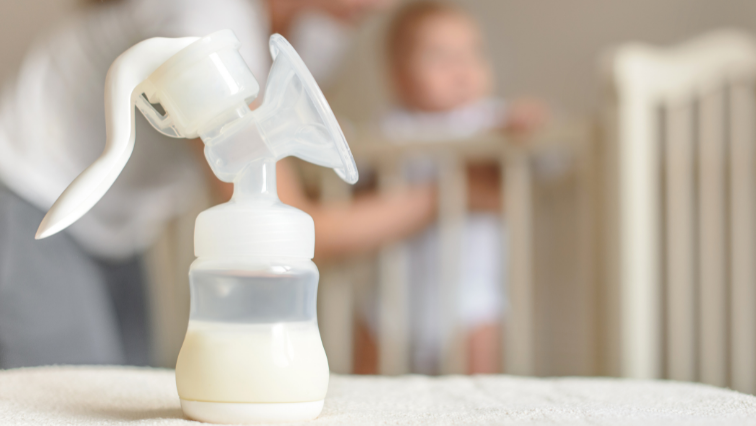Written by: Wendy, IBCLC
First of all, any breastfeeding parent who pumps for their baby is a hero in their own right. Pumping is a labor of love, but it’s labor nonetheless, and so many breastfeeding parents are pumping while balancing work, school, housework, and the care of their other children.
Whether you are pumping at work or are an exclusive pumper, you probably have questions about when it might be an appropriate time to stop and how to go about doing so.
Let’s take a look at some different scenarios and tackle some frequently asked questions about when it’s okay to stop pumping.
WHAT IS THE RIGHT TIME TO STOP PUMPING?
The Academy of American Pediatrics (AAP) recommends exclusive breastfeeding for your baby’s first six months, with complementary foods introduced sometime in the middle of the first year.
Even with solid food introduction, the AAP recommends that babies receive breast milk for their first 12 months and beyond if a parent chooses. As such, parents who are considering decreasing pumping or weaning from the pump usually do so at about six months, when their baby has started to eat solids.
Now, it’s important to note here that “starting solids” doesn’t necessarily mean that a baby is taking a good amount of calories from solid foods. Most babies start by sampling foods and don’t really take in much meaningful nutrition at first.
So, as long as your baby is getting the vast majority of their nutrition from breast milk, it’s not really time to consider dropping pumping sessions. But, as the months go by and your baby is eating more, you can gradually decrease the amount of pumped milk you offer your baby. All babies are different, but this might happen anywhere from 9-12 months of age.
The decision to decrease pumping also depends on what kind of pumper you are and your life circumstances. Let’s take a look at a few different scenarios.
IF YOU PUMP FOR WORK
Pumping at work can be a real challenge, and you may be looking forward to a time when you can start to decrease your pumping sessions. You can usually begin this process once your baby is getting a good amount of calories from solid foods and is willing to start drinking sips of water from a cup or a bottle. (You can offer water to your baby as soon as they start solids.)
For example, if your baby reliably seems to take in one substantial meal of solid foods per day, you can gradually drop one pumping session. Once they start eating two full meals a day, you can drop another. Eventually, you will be able to drop all or most of your pumping sessions at work.
It also depends if you are expecting to continue breastfeeding your baby past 12 months. If you want to continue breastfeeding, then you can take the process of decreasing pumping sessions more gradually. Depending on your child’s willingness to eat solid foods when you are not together, you may be done with pumping by 12-15 months.
Then, you can continue breastfeeding while you and your baby are together. Having breastfeeding connected to bonding, sleepy times, and togetherness will keep up the breastfeeding relationship and allow you to continue breastfeeding your child through toddler-hood, even if you give up pumping while you are at work.
IF YOU ARE AN EXCLUSIVE PUMPER
Exclusive pumpers can take a similar course to breastfeeding parents who pump. As your child starts to take in more solid foods, you can decrease your pumping sessions, making sure that each session is replaced by a meal plus water.
You will still need to pump a substantial amount of breast milk for your child for the first 12 months, though, as the type of solid meals that babies eat don’t usually provide adequate nutrition. Breast milk should still be a baby’s primary food from 6-12 months.
After 12 months, you have two choices. You can continue pumping for your child; just do so less often as their meals are replaced by solids. Or, you can start to replace your pumped milk with full-fat cow’s milk (or whatever milk your baby’s pediatrician recommends, based on their allergy history), and eventually stop pumping for your baby altogether.
Once your baby hits 12 months, you can still provide your baby with 2-3 bottles or cups of breast milk per day, if you want. Doctors continue to recommend that babies receive milk in their diet between 12-24 months, but you can decide if you want that milk to be breast milk or cow’s milk.
TIPS FOR WEANING FROM THE PUMP
However you begin weaning from pumping, you should do so gradually and mindfully. Suddenly dropping a pumping session puts you at higher risk of getting engorged, plugged ducts, or coming down with a breast infection.
It’s also important to take it slow to allow your hormones to adjust: sudden weaning from the pump or from breastfeeding can cause mood swings and depression.
Methods for decreasing pumping can include:
- Picking one pumping session and decreasing the amount of time you pump over the course of a few days, until you are done
- Starting to spread out pumping sessions each day, until one session is naturally dropped
- Dropping one session while keeping your other sessions, and then dropping another session after your body had adjusted
HOW YOU MIGHT FEEL
Even if you are more than ready to stop pumping, it’s common to have mixed feelings as it happens. Pumping is a special gift you give to your child, and it might feel bittersweet to watch it end.
Remember that whatever happens next for you—whether you will continue partially breastfeeding, stop breastfeeding altogether, or end your exclusively pumping journey—there will continue to be ways for you to provide for your child, and to express your love for them.




